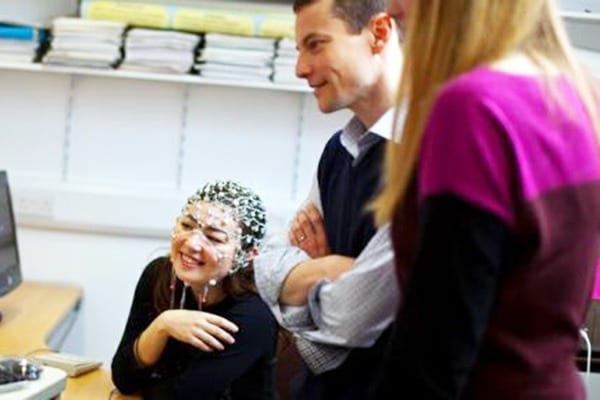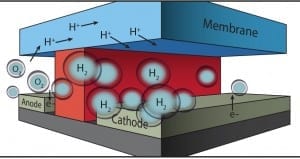
Perpetrators can suppress “crime memories,” study finds
It sounds just like something out of a sci-fi police procedural show—and not necessarily a good one.
In a darkened room, a scientist in a white lab coat attaches a web of suction cups, wires, and electrodes to a crime suspect’s head. The suspect doesn’t blink as he tells the detectives interrogating him, “I didn’t do it.”
The grizzled head detective bangs his fist on the table. “We know you did!” he yells.
The scientist checks his machine. “Either he’s telling the truth … or he’s actively suppressing his memories of the crime,” says the scientist.
“Dammit,” says the detective, shaking his head, “this one’s good.”
But it isn’t fiction. Some law enforcement agencies really are using brain-scan lie detectors, and it really is possible to beat them, new research shows.
The polygraph, the more familiar lie detection method, works by “simultaneously recording changes in several physiological variables such as blood pressure, pulse rate, respiration, electrodermal activity,” according to a very intriguing group called the International League of Polygraph Examiners. Despite what the League (and television) might have you believe, polygraph results are generally believed to be unreliable, and are only admitted as evidence in U.S. courts in very specific circumstances.
The brain-scan “guilt detection test” is a newer technology that supposedly measures electrical activity in the brain, which would be triggered by specific memories during an interrogation. “When presented with reminders of their crime, it was previously assumed that their brain would automatically and uncontrollably recognize these details,” explains a new study published last week by psychologists at the University of Cambridge. “Using scans of the brain’s electrical activity, this recognition would be observable, recording a ‘guilty’ response.”
Law enforcement agencies in Japan and India have started to use this tool to solve crimes, and even to try suspects in court. These types of tests have not caught on with law enforcement in the U.S., though they are commercially available here. That’s probably a good thing; the researchers of this study found that “some people can intentionally and voluntarily suppress unwanted memories.”
The experiment was pretty straightforward, and the participants were no criminal masterminds. Ordinary people were asked to stage mock crimes, and then were asked to “suppress” their “crime memories,” all while having their brains scanned for electric activity. Most people could do it, the researchers found: “a significant proportion of people managed to reduce their brain’s recognition response and appear innocent.”
The Latest Bing News on:
Brain-Scan Lie Detectors
- MIT’s New MRI Technique Reveals Hidden Light Deep in the Brainon May 10, 2024 at 7:05 am
A novel MRI technique developed at MIT allows for detailed imaging of bioluminescence deep within the brain, offering new insights into how brain cells develop and communicate with each other.
- Using MRI, engineers have found a way to detect light deep in the brainon May 10, 2024 at 6:39 am
That dilation can then be observed with magnetic resonance imaging (MRI), allowing researchers to pinpoint the source of light. "A well-known problem that we face in neuroscience, as well as other ...
- Brain Injury Newson May 7, 2024 at 5:00 pm
as seen on brain scans, may be tied more strongly to vascular risk factors, brain shrinkage, and other markers ... Dec. 12, 2023 — Smoking shrinks the brain and effectively causes premature ...
- What is magnetic resonance imaging? | Explainedon May 6, 2024 at 2:45 pm
Magnetic resonance imaging (MRI) is used to obtain images of soft tissues within the body. Soft tissue is any tissue that hasn’t become harder through calcification. It is a non-invasive diagnostic ...
- Brain scan can 'find' racismon April 26, 2024 at 5:00 pm
Scientists have developed a brain scan they claim can tell whether a person is racist. A group of 30 white volunteers were shown photographs of black individuals. Those with racist tendencies ...
- News tagged with brain scanson April 23, 2024 at 5:00 pm
If "brain age" could be easily calculated, ... A new study from Brigham and Women's Hospital suggests that positron emission tomography (PET) brain scans could reveal hidden inflammation in ...
- Humans Aren't Innately Selfish, Brain Scans Revealon April 15, 2024 at 10:00 am
This imaging technique revealed that the reward systems of the brain were active when the participants were considering their own preferences, as well as the preferences of others. It was also ...
- Psychosis: Brain Scan Study Sheds Light On Mental Health Mysteryon April 15, 2024 at 8:25 am
The study, published in Molecular Psychiatry, analyzed brain scan data from children ... new avenues for treatment and prevention. Early detection of abnormal brain function may enable targeted ...
- What’s Your Dog Thinking? A Brain Scan Offers Clueson February 20, 2021 at 8:56 am
which was the first to teach dogs to lie still without sedation in an MRI scanner so their brains can be studied. By peering into a dog’s brain, researchers are able to see how it reacts to ...
- A lie detector for kids, really?on December 1, 2010 at 6:54 am
interesting. Check it out. A lie detector for kids? The toy is recommended for ages 6 and up; developmentally, most children learn to lie by around age 4 (and it is an important developmental ...
The Latest Google Headlines on:
Brain-Scan Lie Detectors
[google_news title=”” keyword=”Brain-Scan Lie Detectors” num_posts=”10″ blurb_length=”0″ show_thumb=”left”]
The Latest Bing News on:
Crime memories
- Why Bothwell Castle means so much to me by crime writer Abir Mukherjeeon May 10, 2024 at 8:17 am
Bothwell Castle was also my late father’s favourite spot. He’d walk there most evenings until age and infirmity made it difficult. Each ...
- Their loved ones were murdered in Boston. On Mother's Day, they keep memories alive.on May 10, 2024 at 6:52 am
Boston is experiencing a lower number of homicides this year compared to last year. But for families affected by the violence, it's not enough. The Louis D. Brown Peace Institute hosts its 28th annual ...
- Murder In Mahim: Ashutosh Rana reveals fond memories from Mahim station - Exclusiveon May 10, 2024 at 5:40 am
The actor said, "Watch Murder In Mahim since May 10. I do not have any fond memories, our show is going to come, so we want more people to watch it. Till now Murder In Mahim was our show but as soon ...
- 20 Questions On Deadline Podcast: Judith Light On New Apple TV+ Show ‘Before’ With Billy Crystal, Her Favorite Memories & Best Life Adviceon May 9, 2024 at 9:00 am
My guest this week is Judith Light. Last season, we saw her take home an Emmy for her guest role in Poker Face, in which she hilariously climbed a rose trellis while cleverly camouflaged in a natty ...
- 5 of the Best Crime Games To Play While You Wait On the Next GTA 6 Traileron May 8, 2024 at 5:43 am
Especially when these adventures involve crime, an open world, and even timeless memories. Here are the 5 games you should try out which may just temporarily occupy the void that’s to be filled by GTA ...
- A woman’s abduction from a busy Hong Kong street revives memories of past kidnappings, including when tycoons were targets for notorious gangsterson May 7, 2024 at 11:53 am
Kidnapping is nothing new in Hong Kong and a woman snatched from a busy Tsim Sha Tsui has revived memories of the city’s history of abductions.
- Palm Springs’ Arthur Lyons Film Noir Festival Celebrating 25th Anniversary With a Cinematic Crime Waveon May 6, 2024 at 10:19 am
One of southern California's signature noir festivals, the Arthur Lyons Film Noir Festival, is returning to Palm Springs with a weekend of classics.
- A Home In Kosovo Preserves The Memories Of Massacre Victimson May 6, 2024 at 3:17 am
Childrens clothes notebooks and family mementos from 53 Albanian civilians -- mostly children women and the elderly -- stand in ...
- Memories rise 10 years after tragic mass shootingon May 3, 2024 at 8:59 pm
On May 3, 2014, a mass shooting in Jonesboro left four people dead including the shooter, a twelve-year-old girl, and two men.
- Delve into New England true crime with ‘Murder, She Told’ podcaston May 2, 2024 at 7:31 am
Connect with “Murder, She Told” on Instagram, Tik Tok and Facebook.
The Latest Google Headlines on:
Crime memories
[google_news title=”” keyword=”crime memories” num_posts=”10″ blurb_length=”0″ show_thumb=”left”]










